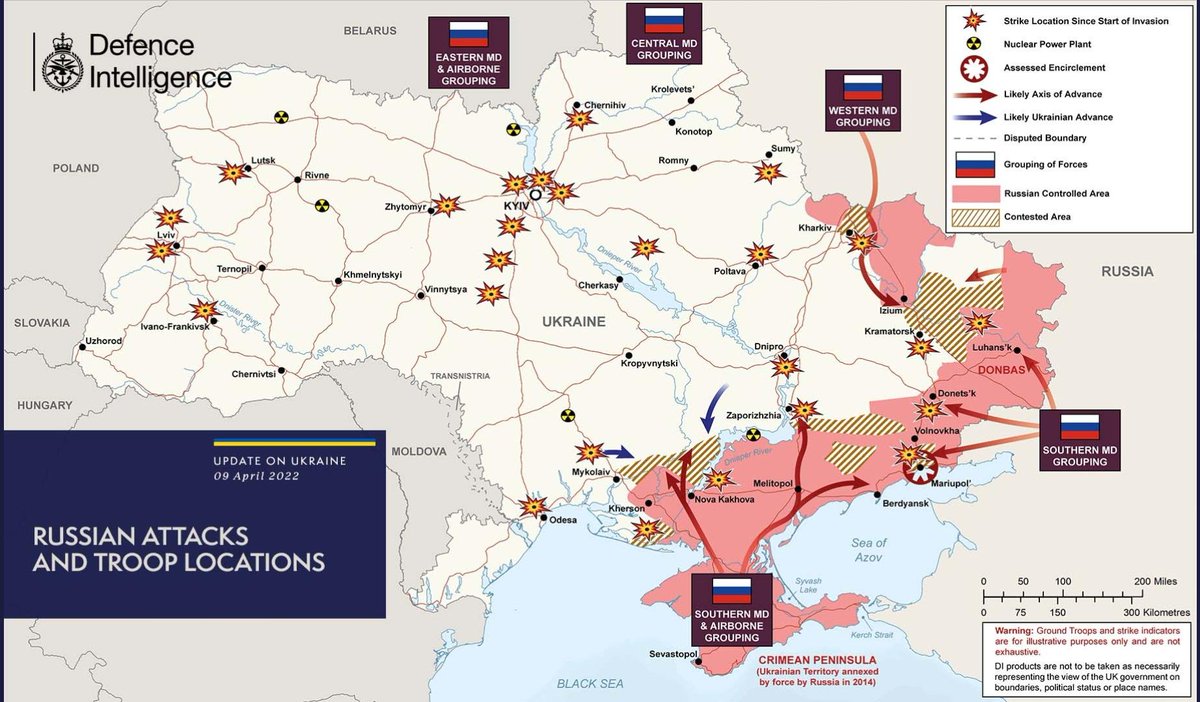
Good morning Twitter. It appears one can comfortably assert that on 13 April 2022, a new piece of naval history was written in the context of this terrible affair that is the Russian invasion of Ukraine. A thread on the RFN cruiser Moskva (pennant No 121): 

This is not a spring chicken in naval terms. It's a venerable, battle hardened, major surface combatant. Saw action in Russian invasion of Georgia in 2008, when it was sent to secure the BS - and sustained a hit. wired.com/2008/08/georgi…
This is relevant because it raises a question about battle-readiness and overall op condition. A ship first commissioned in 1983, it was recommissioned in 2000, and was supposed to undergo refit and upgrade in 2016 - but it did not.
https://twitter.com/delfoo/status/1514510627045265408
The extent to which the ship was in a less than ideal state is debatable, but a couple of things matter here:
1. this is the flagship of the BS Fleet of the RFN;
2. it’s primary mission was to secure sea control and exploit;
3. it saw action very early on in the invasion.
1. this is the flagship of the BS Fleet of the RFN;
2. it’s primary mission was to secure sea control and exploit;
3. it saw action very early on in the invasion.
Perhaps the most iconic symbolism around the role of the Moskva is captured in the shelling of Snake Island, with the now image of the Ukrainian soldiers responding in kind to the ship hailing them to surrender: the ultimate David vs Goliath challenge. Grit and Determination. 

Let’ be clear though. This wasn’t just about symbolism. Snake Island occupies a key strategic position for any op vs Odessa to take place, and RFN did what one would expect them to do early on: secure it. As the map shows this is an important place to prevent ops vs Odessa. 

Further, with the closure of the Bosporus to all warships, it also meant that this ship would be the main asset available to support Russian naval ops in the BS. Couple that with the current shift in op focus south, this is not just any ship. This is key asset. This is ‘Moscow’. 

So, what happened, and why does it matter?
We know from official sources that 2 Neptune missiles hit the ship and a major fire ensued. The ship was operating incredibly close to shore, which is remarkable given the limited point defence system it has.
We know from official sources that 2 Neptune missiles hit the ship and a major fire ensued. The ship was operating incredibly close to shore, which is remarkable given the limited point defence system it has.
This raises important questions about familiar themes in this invasion so far:
a. Russian conops;
b. Russian confidence/underestimation of UKR;
c. Russian preparation and readiness.
This ship had no real business so close to shore; it clearly underestimated op risk;
a. Russian conops;
b. Russian confidence/underestimation of UKR;
c. Russian preparation and readiness.
This ship had no real business so close to shore; it clearly underestimated op risk;
The dynamics confirm an old truth: fire is absolutely deadly threat to a naval combatant and if your crew and systems are not in tip top shape, that’s where the difference between success and defeat stands in war at sea. @CovertShores here is very helpful: navalnews.com/naval-news/202…
@CovertShores On the other hand, we need to be very cautious about suggesting that sinking a ship is easy, or that there are ‘lessons’ for any other in here.. whether NATO, China, or anyone else… if I hear anyone making silly comparisons with Taiwan I might explore (sorry I digress).
@CovertShores The one lesson that one can draw from these naval events is that sea denial is a real thing. And it can be done relatively cheaply - if geography and strategic objectives allow it. This here from @CIMSEC is spot on, and absolutely on the money: cimsec.org/an-anti-access…
@CovertShores @CIMSEC So, as I pointed out here:
1. Militarily, the Russians are in a pickle on amphibious plans for Odessa;
https://twitter.com/alessionaval/status/1514499154319392771?s=20&t=UmJjkO2KZgfY0GAQ8juskwearlier on today, there are three very important points to consider here (others as well but once things are clearer):
1. Militarily, the Russians are in a pickle on amphibious plans for Odessa;
@CovertShores @CIMSEC 2. Politically, explaining why Russia could loose its flagship in the theatre where it has sea control is going to be hard - or even hide it;
3. Symbolically, Moscow is on fire. This is Ukraine response to Snake Island. This is David exposing Goliath’s disorientation.
3. Symbolically, Moscow is on fire. This is Ukraine response to Snake Island. This is David exposing Goliath’s disorientation.
@CovertShores @CIMSEC More will be written on this, since this is one of the most severe naval losses since the Falklands War. I shall come back to this too in due time.
For now, expect some more turbulence on the naval front. As weapons arrive, denial will be on the menu.
For now, expect some more turbulence on the naval front. As weapons arrive, denial will be on the menu.
@CovertShores @CIMSEC Tonight Russian commanders will feel less secure as they reflect upon the fact that the BS is no longer their lake. It’s a box with no way out. It’s where denial has exposed the limits of control. Things have got much harder.
Signing off for now. Thank you for reading!
Signing off for now. Thank you for reading!
• • •
Missing some Tweet in this thread? You can try to
force a refresh



